#george cecil ives
Text
British gay/bi male writers and their social circles

As a great admirer of gay literature, the social circles of gay and bisexual male writers is something that piques my interest. Due to the dangerousness of the matter in the past and also because it revolves around a relatively small niche, it seems that there was high level familiarity between these figures. The United Kingdom, a country whose literary input has abundant homoerotic tones, is a very adequate setting to analyze such a configuration.
I've been building a graph on this subject for some time, and now it seems mature enough for me to post it. It's a diagram based on friendship connections — deep or superficial —, although romantic and family-related connections are also included. Just a mutual recognition of existence isn't enough to justify a connection (otherwise most of them would be linked to Wilde!), and rivalries were not considered too. All the writers included were born during the Victorian and Edwardian eras (1837-1910), where this interconnectivity seemed particularly strong.
This is just an early version, as I imagine there is still a considerable amount of information that I missed. Therefore, I'm very open to suggestions and comments on it!
(Three Irishmen were also included in the diagram: Stoker, Wilde and Reid)
#literature#gay literature#lgbt literature#gay history#lgbt history#british literature#english literature#booklr#victorian#edwardian#henry james#edward carpenter#bram stoker#oscar wilde#a. e. housman#j. m. barrie#e. f. benson#george cecil ives#alfred douglas#somerset maugham#e. m. forster#d. h. lawrence#siegfried sassoon#rupert brooke#wilfred owen#robert graves#evelyn waugh#christopher isherwood#john betjeman#w. h. auden
44 notes
·
View notes
Text
rip george cecil ives and your 45 scrapbooks, you would’ve loved blogging on tumblr
6 notes
·
View notes
Text

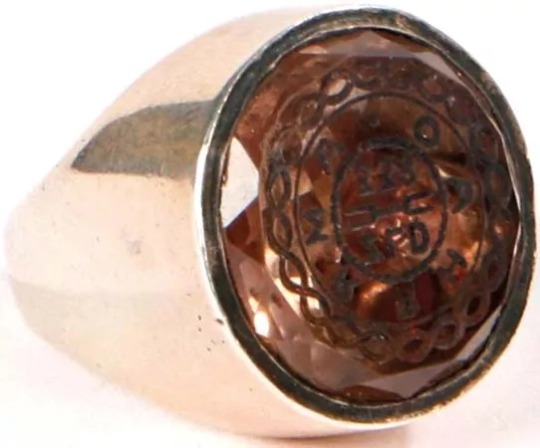
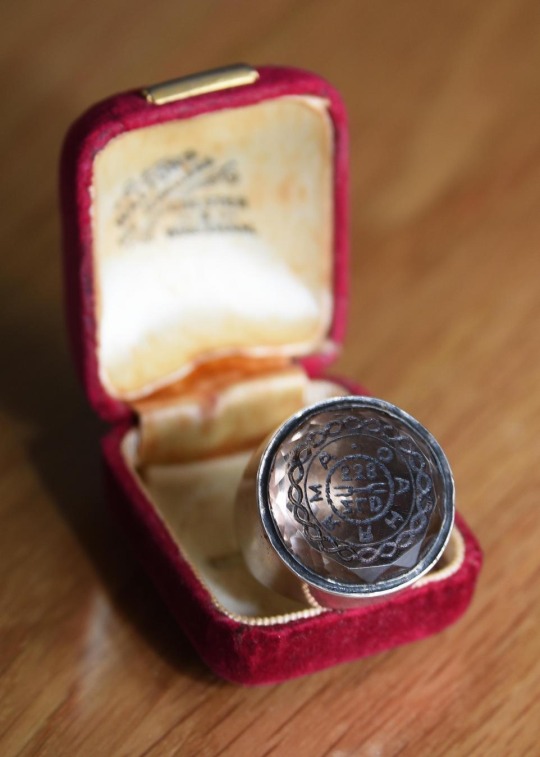




I'm so jealous. I guess it's time I learned how to carve how to carve quartz intaglios.
#George Cecil Ives#Order of Chaeronea#sacred band of thebes#gay rights#queer history#walt whitman#oscar wilde#secret society#jewlery#power ring#smoky quartz#AMRRHAO#338#ZLD
0 notes
Text
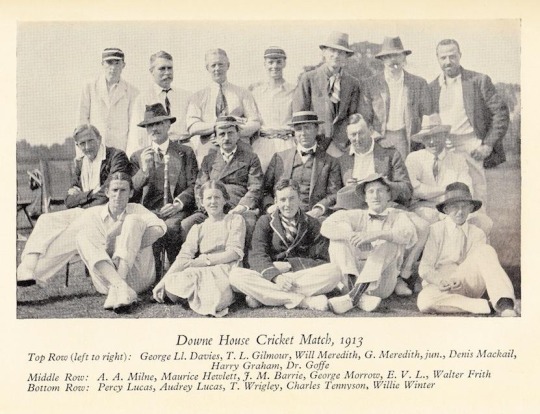
The Allahakbarries was an amateur cricket team founded by author J. M. Barrie, and was active from 1890 to 1913. The team's name was a portmanteau of Barrie's name and the mistaken belief that 'Allah akbar' meant 'Heaven help us' in Arabic (rather than its true meaning: 'God is great'). Notable figures to have featured for the side included Rudyard Kipling, H. G. Wells, Arthur Conan Doyle, A. A. Milne, E. W. Hornung, Henry Justice Ford, A. E. W. Mason, Walter Raleigh, E. V. Lucas, Maurice Hewlett, Owen Seaman, George Cecil Ives, and George Llewelyn Davies, as well as the son of Alfred Tennyson.
Barrie's enthusiasm for the game eclipsed his talent for it; asked to describe his bowling, he replied that after delivering the ball he would go and sit on the turf at mid-off and wait for it to reach the other end which "it sometimes did". The team played for the love of the game, rather than the results it achieved, and Barrie was generous in his praise for his teammates and opposition alike. He praised one teammate's performance by observing that "You scored a good single in the first innings but were not so successful in the second" while he lauded the opposition's effort by pointing out how "You ran up a fine total of 14, and very nearly won". He instructed Bernard Partridge, an illustrator from Punch magazine who was afflicted with a lazy eye, to "Keep your eye on square leg" while bowling, and told square leg, "when Partridge is bowling, keep your eye on him." He forbade his team to practise on an opponent's ground before a match because "this can only give them confidence".
— Wikipedia
#lmaooo#like hello??? gang’s all here???#it’s the literary avengers (of cricket)#j.m. barrie#a.a. milne#sir arthur conan doyle#h.g. wells
21 notes
·
View notes
Text
Walt Whitman
Continuing my series of learning about things referenced in the book, I'm looking at things Alex references when he talks about engaging with queer history. These are all tagged #a series of learning about things that are referenced in the book, if you want to block the tag.

Walt Whitman, born May 1819, is one of America's influential poets. He is best known for Leaves of Grass, a poetry collection initially published in 1855 but continually amended until his death in 1892. It grew from 12 poems to over 400.
He has been described as a queer pioneer, and his work spoke to and inspired many queer men of the same time, including Oscar Wilde and Bram Stoker. His poems often referenced queer love, although did so in ways that allowed him to deny it, and that signalled as queer to those of his own community. "The affection he felt toward these soldiers, his descriptions, seem to speak to a gay readership," Gooch said. "He wrote about 'comrades' a lot. He seemed to be writing in a sort of code."
Whitman's sexuality is, as is common with historical figures, debated. The theories range from Whitman being bisexual, to his relationships with men being deeply loving but platonic. Whitman did appear to have relationships with women, having a romantic friendship with Ellen Grey - an actress - in 1862, and he later referred to her as "an old sweetheart of mine." [Callow]
However, his relationships and encounters with men are also prevalent. Oscar Wilde was quoted as having told George Cecil Ives (a homosexual-rights activist) "I have the kiss of Walt Whitman still on my lips." [Stokes] Peter Doyle, a bus conductor, met Whitman in the mid 1860s, and they were inseparable for several years. When Doyle was interviewed in 1895, he said of Whitman: "We were familiar at once—I put my hand on his knee—we understood. He did not get out at the end of the trip—in fact went all the way back with me." [Kaplan] Another relationship Whitman had was with Harry Stafford, which lasted over several years. When writing to Whitman about the ring he had given Stafford, Stafford wrote "You know when you put it on there was but one thing to part it from me, and that was death." [Folsom]
-----
A very brief example of some of Whitman's poetry that has been read as queer:
Song of Myself (1892 version)
13
His blue shirt exposes his ample neck and breast and loosens over his hip-band,
His glance is calm and commanding, he tosses the slouch of his hat away from his forehead,
The sun falls on his crispy hair and mustache, falls on the black of his polish’d and perfect limbs.
I behold the picturesque giant and love him, and I do not stop there,
I go with the team also.
15
The machinist rolls up his sleeves, the policeman travels his beat, the gate-keeper marks who pass,
The young fellow drives the express-wagon, (I love him, though I do not know him;)
"Live Oak, with Moss"
VIII
Hours of my torment—I wonder if other men
ever have the like out of the like
feelings?
Is there even one other like me—distracted
— his friend, his lover, lost to him?
XI
For an athlete loves me, and I him-But
toward him there is something fierce
and terrible in me,
I dare not tell it in words—not even in these
songs.
See also;
We Two Boys Together Clinging
A Glimpse
Sources:
Callow, Philip. From Noon to Starry Night: A Life of Walt Whitman
Folsom, Ed (April 1, 1986). "An Unknown Photograph of Whitman and Harry Stafford". Walt Whitman Quarterly Review. 3 (4): 51–52.
Kaplan, Justin (2003). Walt Whitman: A Life.
Stokes, John, Oscar Wilde: Myths, Miracles and Imitations 1996
Wikipedia: Leaves of Grass
Wikipedia: Walt Whitman
Additional Reading:
Schmidgall, G. (1997). Walt Whitman: A Gay Life. Dutton.
Walt Whitman’s “Song of Myself”: Just the Gay Parts
Making Queer History: Walt Whitman - note the warning for anti-Black racism & nationalism
Loving, Jerome. Walt Whitman: The Song of Himself. 1999
#red white and royal blue#rwrb#meta#long post#a series of learning about things that are referenced in the book#elio's#elio's meta
16 notes
·
View notes
Text
THIS DAY IN GAY HISTORY
based on: The White Crane Institute's 'Gay Wisdom', Gay Birthdays, Gay For Today, Famous GLBT, glbt-Gay Encylopedia, Today in Gay History, Wikipedia, and more …

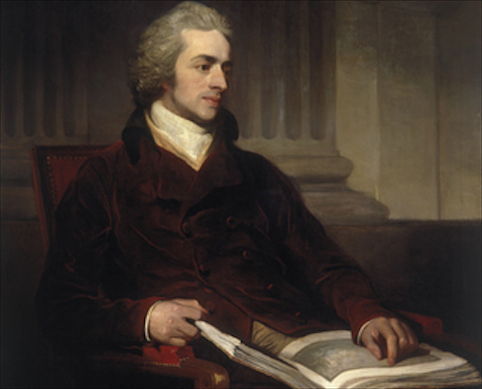
1760 – Extremely wealthy British author and connoisseur William Beckford (d.1844) was ostracized by English society for the last sixty years of his life because of his homosexuality.
Beckford's father was alderman and lord mayor of London, and his mother, connected by marriage to the Dukes of Hamilton, a stern and unrelenting Calvinist. Beckford's father died when he was ten, and his mother decided that it would be best not to risk sending her delicate son away to school. She hired a series of tutors and monitored his education herself. Beckford early on displayed an interest in art and music, and especially in the exotic Oriental arts of the Arab world.
As he entered adolescence, he was lucky that one of his series of tutors was Alexander Cozens, whose own fascination with Eastern lore encouraged Beckford's own. At the same time that Beckford's aesthetic taste began to develop, so did his devotion to emotional self-indulgence.
Chief among his emotional attachments was a young cousin, William Courtenay, known as "Kitty" to family and friends, who responded to Beckford's attentions with adolescent devotion. For years, Beckford poured out his soul in a series of epistolary endearments to Courtenay that were as extreme as they were indiscreet. These letters, almost inevitably, fell into the hands of Courtenay's reactionary and powerful uncle Lord Loughborough, a chief justice.
Although, Loughborough could not catch Beckford and Courtenay in flagrante dilecto, he let out a rumor that he had, and he advertised the scandal in the morning newspapers from October through December 1784. The result of this newspaper campaign was the utter ruin of Beckford's reputation.
He lived as an exile in his own estate at Fonthill, and he traveled freely on the continent. But he was never again received in polite society.
He lived until 1844, for sixty years an outcast. In his travels, he met various men who befriended him and boys whom he loved. Some stayed close to him throughout his life, and a few earned his sincere devotion. But society meant too much to him not for him to feel the blow of his disgrace, and the frantic building that went on at his estate, which began with a wall around the entire property and ended with his massive gothic Fonthill Abbey with its huge central tower, might be understood as his attempt to deal with his status as an outcast.

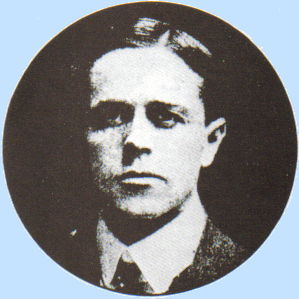
1867 – George (Cecil) Ives (d.1950) was a German-English poet, writer, penal reformer and early gay rights campaigner.
Ives was the illegitimate son of an English army officer and a Spanish baroness. He was raised by his paternal grandmother in Hampshire and the South of France. Ives was educated at home and at Magdalene College, Cambridge, where he started to amass 45 volumes of scrapbooks (between 1892 and 1949). These scrapbooks consist of clippings on topics such as murders, punishments, freaks, theories of crime and punishment, transvestism, psychology of gender, homosexuality, cricket scores, and letters he wrote to newspapers.
Ives met "Oscar Wilde at the Authors' Club in London in 1892. Oscar Wilde was taken by his boyish looks and persuaded him to shave off his moustache, and once kissed him passionately in the Travellers' Club. Ives was already working for the end of the oppression of homosexuals, what he called the "Cause." He hoped that Wilde would join the "Cause", but was disappointed. In 1893, Lord Alfred Douglas, with whom he had a brief affair, introduced Ives to several Oxford poets whom Ives also tried to recruit.
By 1897, Ives created and founded the Order of Chaeronea, a secret society for homosexuals which was named after the location of the battle where the Sacred Band of Thebes was finally annihilated in 338 BC. Members included Charles Kains Jackson, Samuel Elsworth Cottam, Montague Summers, and John Gambril Nicholson.
The same year, Ives visited Edward Carpenter at Millthorpe. This marked the beginning of their friendship.
In 1914, Ives, together with Edward Carpenter, Magnus Hirschfeld, Laurence Housman and others, founded the British Society for the Study of Sex Psychology. He also kept in touch with other progressive psychologists such as Havelock Ellis and Professor Cesare Lombroso.
The topics addressed by the Society in lectures and publications included: the promotion of the scientific study of sex and a more rational attitude towards sexual conduct; problems and questions connected with sexual psychology (from medical, juridical, and sociological aspects), birth control, abortion, sterilisation, venereal diseases, and all aspects of prostitution. In 1931, the organisation became the British Sexological Society.
As he grew older Ives developed odd passions. When the Second World War ended he refused to believe it and carried a gas mask with him until his death. He was also afraid to sleep alone and would always contrive to have at least one bed fellow.
Throughout his life, Ives had many lovers whom he called his "children". He took care of them, gave them money and bought them houses. He often lived with more than one lover at a time and some stayed with him several years.
At his death in 1950, George Ives left a large archive covering his life and work between 1874 and 1949. The papers were bought in 1977 by the Harry Ransom Research Center at the University of Texas at Austin.
The bulk of the material consists of 122 volumes of diaries kept by Ives from the age of nineteen until about six months before his death at age eighty-two. Most of the diaries have daily entries. The view Ives provides in his diary of the life of an upper-middle class English homosexual from the end of the nineteenth century to the mid-twentieth century is of particular interest for understanding the homosexual movement in England during this time.
He was the model for Raffles, the fictional Victorian gentleman thief, according to Andrew Lycett, who says that the creator of Raffles, William Hornung, "may not have understood this sexual side of Ives' character", but that Raffles "enjoys a remarkably intimate relationship with his sidekick Bunny Manders."

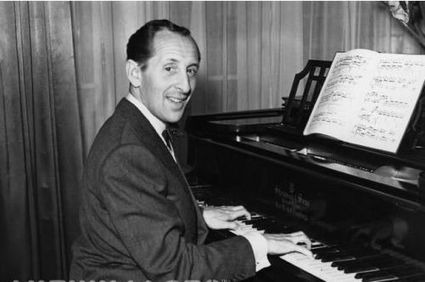
1903 – Vladimir Horowitz (d.1989) was a Russian-born American classical pianist and composer. His technique and use of tone color and the excitement of his playing were legendary. He is widely considered one of the greatest pianists of the 20th century.
Born in Kiev, now capital of the Ukraine, Horowitz received piano instruction from an early age, initially from his mother, who was herself a pianist. In 1912 he entered the Kiev Conservatory. His first solo recital was in Kharkiv in 1920.
Horowitz's fame grew, and he soon began to tour Russia where he was often paid with bread, butter and chocolate rather than money, due to the country's economic hardships caused by the Civil War. During the 1922-1923 season, he performed 23 concerts of eleven different programs in Petrograd alone. Despite his early success as a pianist, Horowitz maintained that he wanted to be a composer, and undertook a career as a pianist only to help his family, who had lost their possessions in the Russian Revolution.
In December 1925, Horowitz crossed the border into the West, ostensibly to study with Artur Schnabel. Privately intending not to return, the pianist had stuffed American dollars and British pound notes into his shoes to finance his initial concerts.
On December 18, 1925, Horowitz made his first appearance outside his home country, in Berlin.He later played in Paris, London and New York City. Horowitz gave his United States debut on January 12, 1928, in Carnegie Hall. He played Tchaikovsky's Piano Concerto No. 1 under the direction of Sir Thomas Beecham, who was also making his U.S. debut. Horowitz's success with the audience was phenomenal, and his place in American music was assured.
Despite his marriage, in 1933, to Arturo Toscanini's daughter, there were persistent rumors of Horowitz's homosexuality. Arthur Rubinstein said of Horowitz that "Everyone knew and accepted him as a homosexual." David Dubal wrote that in his years with Horowitz, there was no evidence that the octogenarian was sexually active, but that "there was no doubt he was powerfully attracted to the male body and was most likely often sexually frustrated throughout his life." Dubal observed that Horowitz sublimated a strong instinctual sexuality into a powerful erotic undercurrent which was communicated in his piano playing. Horowitz, who denied being homosexual, once joked "There are three kinds of pianists: Jewish pianists, homosexual pianists, and bad pianists."
In the 1940s, Horowitz began seeing a psychiatrist. According to sources, this was an attempt to alter his sexual orientation.
Vladimir Horowitz died on November 5, 1989 in New York of a heart attack, aged 86. He was buried in the Toscanini family tomb in the Cimitero Monumentale, Milan, Italy.


Wowereit (R) with Kubicki
1953 – Klaus Wowereit is a German politician, member of the SPD (Social Democratic Party), and was the Mayor of Berlin from the 21 October 2001 state elections, where his party won a plurality of the votes, 29.7%, until December 2014. He served as President of the Bundesrat (the fourth highest office in Germany) in 2001/02. His SPD-led coalition was re-elected in the 2006 elections; after the 2011 elections the SDPs coalition party switched sides. He was also sometimes mentioned as a possible SPD candidate for the Chancellorship of Germany (Kanzlerkandidatur) in the next German federal election, but that never materialized.
Wowereit is one of the most famous German politicians who is openly gay. In coming out, prior to the 2001 mayoral elections, he coined the now famous German phrase "Ich bin schwul, und das ist auch gut so." ("I'm gay, and that is a good thing.") In his autobiography, Wowereit states that his decision to come out in public was made because after his nomination as candidate to become the Mayor of Berlin, he felt that the German tabloids were already "on the right track". With his coming out, Wowereit wanted to beat the tabloids to it and prevent them from writing wild, sensational and fabricated stories about his private life. Wowereit said those now famous words during a convention of the Berlin SPD. After the end of his speech, there was half a second of surprised silence, then spontaneous cheering and loud applause to support him.His election as mayor made Berlin one of three major European cities with an openly gay mayor, along with Paris, whose mayor is Bertrand Delanoë, and Hamburg, whose mayor was Ole von Beust at that time, who both also took office in 2001. However, von Beust resigned in 2010, making Wowereit the only gay mayor of a major German city. Previously, the largest city with a gay mayor had been Winnipeg, Manitoba, Canada, with mayor Glen Murray.
In September 2007, Wowereit published an autobiographical book titled "…und das ist auch gut so.", after his famous coming-out phrase
Wowereit's civil partner, Jörn Kubicki, is a neurosurgeon. They have been in a relationship since 1993.


1991 – Gus Kenworthy is a British-born American freestyle skier from Telluride, Colorado who competes in slopestyle and also the halfpipe. Kenworthy won the silver medal in Men's freestyle skiing at the 2014 Winter Olympics in Sochi, Russia.
Kenworthy is the youngest of three sons of an English mother and an American father, Pip and Peter Kenworthy. He has two older brothers, Hugh and Nick Kenworthy.
Kenworthy's father, Peter, has been the executive director of the Mountainfilm film festival in Telluride, since 2006. He is a former banker from Philadelphia, who worked in London (UK) for several years. Kenworthy's mother, Pip, is English and originally from Bristol, England. She was born into a large family, with eight siblings. After moving to London in the early 1970s, she began working backstage in costumes, at the Kings Head Theatre Club. She also ran a vintage booth at the Camden Lock Market. She emigrated with her then husband, Peter, and her sons, including then two-year-old Gus, to Telluride, in 1993.
Kenworthy graduated from Telluride High School in June 2010. He could have graduated in 2009, but decided instead to take a year off to ski.
Kenworthy won AFP World Championships overall titles in 2011, 2012, and 2013. In 2013, he placed second at the Olympics in Sochi, Russia and won his first medal, a bronze, at the X Games in Tignes, France in the slopestyle event.
On February 13, 2014, Kenworthy won the silver medal during Winter Olympics in Sochi.
Kenworthy gained international media attention as a result of his photographer friend, Robin Macdonald, texting him a photo of five stray dogs: four puppies and their mother; during their stay in Sochi, at the 2014 Winter Olympics. He stayed behind for more than a month to save the family of dogs, and others; while he fought to bring them back home. Their adoption of these dogs helped bring further attention to the problematic rise of the stray dog population in Sochi, which grew significantly during the Olympics.
In October 2015, Kenworthy came out as gay. Rolling Stone noted the "freestyle medalist is the first action-sports star to come out." After a long term relationship with Canadian photographer Robin Macdonald, he is was dating Matthew Wilkas. The two gained some attention when they shared their Times Square kiss on New Year's Eve 2015. Although the two are no longer together, they are still good friends.


1956 – The U.S. Second Circuit Court of Appeals upholds the deportation of a Gay alien for exposing himself in a restroom. The concurring opinion of Judge Jerome Frank limits his support for the deportation to the alien's lying about a previous conviction. Frank embarks on a remarkable opinion raising questions about why homosexuality seems to bother people so much.

1936 – Francisco Franco is proclaimed Generalissimo and Head of State in Spain. His dictatorship lasts 40 years during which thousands of homosexuals are jailed, put in camps, or locked up in mental institutions for breaking the Vagrancy Act.

1783 – The last execution for sodomy in France occurs—a friar is broken on the wheel.


11 notes
·
View notes
Text
Queer books, day 11/30
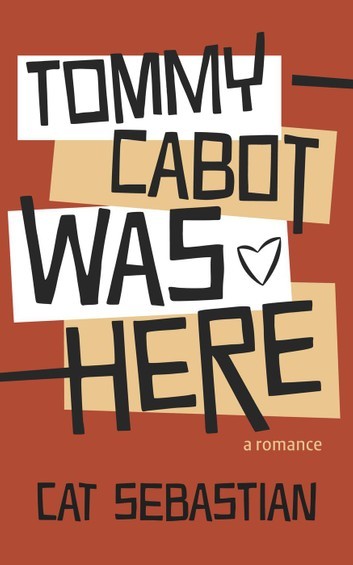
I wasn't sure if I was going to talk about these separately, but here we are. The series is three books (I talked about book 2 already), and this is book one. It's a novella, a short second-chance love story between a rejected Kennedy and his math teacher childhood best friend.
It's set in 1959 in Massachusetts, and Sebastian does some pretty interesting stuff with that setting that I think is worth looking at. Of course, the characters experience what she typifies as "period-typical homophobia," which comes down to Tommy having been kicked out of his family when he came out of the closet and Everett wondering if he'll have to get a different job if his relationship with Tommy becomes common knowledge. Tommy's ex-wife, Patricia, is in a relationship with a person named Harry (short for Harriet, although they're very masc-presenting) and is rather unconcerned about how it's perceived, in part because she's rich. But there's also a moment when Tommy's nephew (Peter; now you see how this hooks into the next one) comes to visit (and come out to his uncle) and mentions his gay friend has said that gay people should stick together. Meaning that this book is trying to depict the beginnings of a queer consciousness that...(gestures broadly) is still ongoing.
That's not to say that historically, 1959 is the first time any of that happened. Remember when I mentioned Lawrence Housman and the Order of Chaeronea (which was founded by George Cecil Ives in 1897; I don't know if I implied that Housman founded it, a mistake on my part if so, he just joined). And there were a few other groups before that. But given that in the next ten years we get the Cooper Do-Nuts Riot in 1959 or 1960, the Compton Cafeteria Riot in 1966 and then Stonewall in 1969, this does feel like a pivotal moment for gay rights. A moment at which things that had been bubbling under the surface finally started coalescing. Much as Tommy Cabot's long-denied sexual identity starts bubbling to the surface after years of repression. SEE WHAT I DID THERE?
Anyway. The book contains this quote, which I keep coming back to:
Nobody had told [Tommy] how much of his late thirties would involve lying on floors and crying.
Tommy and Everett are one of my favorite couples in Sebastian's work, and although we see them again in book 3, we don't ever really get to spend more time with them, which is a pity. So many romance novels are about bright young things, and as a not-bright-young-thing myself, it's nice to see people d'un certain age portrayed.
There's sex in this one, but it's not super graphic. This is very much about love and rediscovery and connection. 10/10, go read it.
7 notes
·
View notes
Link
1 note
·
View note
Photo

George Cecil Ives (deceased)
Gender: Male
Sexuality: Gay
DOB: 1 October 1867
RIP: 4 June 1950
Ethnicity: English, Spanish
Occupation: Prof cricket player, poet, writer, prison reformer, LGBT activist
#George Cecil Ives#lgbt history#gay history#lgbt#lgbtq#male#gay#1867#rip#historical#white#athlete#cricket#poet#writer#activist
59 notes
·
View notes
Text
That you will never vex or persecute lovers.
That all real love shall be to you as sanctuary.
That all heart-love, legal and illegal, wise and unwise, happy and disastrous, shall yet be consecrate for that love's Holy Presence dwelt there.
Dost thou so promise?
- The Vow That Shall Make You One of Our Number
2 notes
·
View notes
Photo

George Cecil Ives - 1 October, 1867 - 4 June, 1950:
George Cecil Ives was a German-English writer, poet, penal reformer and a homosexual law campaigner. Raised by grandmother Emily Ives, Ives lived between Bentworth in the United Kingdom and the South of France where he was home educated and later enrolled at Magdalene College, Cambridge. This sparked the beginning of Ives’ work as he began compiling volumes of diaries and scrapbooks - containing clippings from a diverse range of topics - spanning from his interests such as cricket to wider areas such as theories on crime and punishment, psychology of gender, transvestism and homosexuality.
Ives met Oscar Wilde at the Authors Club in London in 1892. Ives had accepted his sexuality and now focused upon advancing what he identified as ‘The Cause’ which worked to combat against the oppression of homosexuals. Though Wilde didn’t share the same passion for ‘The Cause’ that Ives did, that didn’t hinder him and in 1897, he organised the first formal homosexual rights group, The Order of Chaeronea, a secret society named after the battle where male lovers of the Theban Band were killed in 38BC. Ives understood that ‘The Cause’ would not be accepted by wider society, so the society ran under a system of codes, passwords and ceremonies and eventually members were enlisted from all the over the globe - helping to promote gay rights worldwide.
Sex psychology also was one of Ives’ core interests and through his connections within the field, he began the British Society for the Study of Sex Psychology in 1914. The society addressed multiple areas and progressive ideas such as a more rational attitude towards sexual conduct, birth control and abortion as well as prostitution. In an era that often sought to conserve, Ives’ work was forward-thinking and was one of the first instances of homosexual rights campaigning in Britain and, although less known, George Cecil Ives should be highlighted as an influential figure within queer history.
41 notes
·
View notes
Text
George Cecil Ives, and early gay rights campaigner, met Oscar Wilde once and asked him to join the Cause™ but Oscar said no and George was sad. He was also involved with Bosie Douglas at one point and he was one of the founders of the Order of Chaeronea, an underground group of LGBTQ+ people.
#i love george cecil ives#i'm gonna do a presentation on him#when i'm done with my oscar wilde presentation#george cecil ives#queer history#oscar wilde#lord alfred douglas
21 notes
·
View notes
Text
EW Hornung was like “Arthur J. Raffles, you are based off the two gayest men I know.”
123 notes
·
View notes
Quote
With whom, then, should I sleep? perhaps with thee,
And gaze into those eyes, those deep sad eyes,
Feeling the drowsy touch of thy vast wings.
Thy brother Sleep I know, with him have lain
Many a night, forgetting all the day
And every pain in that sweet comradeship.
Ah, he is younger, gay, capricious oft,
Dwelling with some for hours, or else away,
As with my friend, for lonely days and nights.
But thou, angel of night, youth of the silent glance,
All sleep with thee, but yet how diversely,
And but the very few hail thee with gladness.
Say would there be a telling of our tryst,
A wild Greek meeting with my spirit free,
Or would it be but rest, a heavy sleeping?
I fancy I could echo sighs with thee,
Picturing all the sights that thou hast seen,
And flying in my thought where thou hast flown.
George Cecil Ives, “With Whom, Then, Should I Sleep?” (1896)
14 notes
·
View notes
Text








When a fan art involving the Dissidia/Persona 3 crossover containing plenty of VA jokes inspired you to make these very random teams.
#akira ishida#hikaru midorikawa#maaya sakamoto#yuri lowenthal#liam o'brien#grant george#relationship voice actor#voice actor joke#final fantasy#final fantasy i#final fantasy ii#final fantasy iv#final fantasy ix#final fantasy xiii#dissidia final fantasy#dissidia final fantasy nt#dissidia final fantasy nt free edition#warrior of light#firion#cecil harvey#kain highwind#kuja#lightning#claire farron
24 notes
·
View notes
Quote
We believe in the glory of passion. We believe in the inspiration of emotion. We believe in the holiness of love. Now some in the world without have been asking as to our faith, and mostly we find that we have no answer for them. Scoffers there be, to whom we need not reply, and foolish ones to whom our words would convey no meaning. For what are words? Symbols of kindred comprehended conceptions, and like makes appeal to like.
George Cecil Ives, who said this over 100 years ago to defend love between men
25 notes
·
View notes